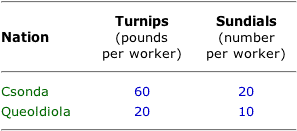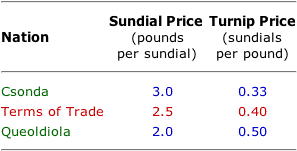
|
|
P-E RATIO: Also termed the price-earnings ratio, this is the ratio of the current price for one share of corporate stock to the earnings (profit) per share of stock. This is used by many financial analysts and investors as an indicator of a company's performance and potential for future growth. A relatively high price-earnings ratio suggests that investors think the company has a great deal of future growth potential. It can also be a sign, however, that the company is seriously overpriced and due for a big drop.
Visit the GLOSS*arama
|
|


|

|
                           TERMS OF TRADE: The rate at which goods are traded, either between individuals or between nations. It is the quantity of one good exchanged per unit of another good. The terms of trade is essentially the price. But the price is stated in terms of the quantity of another good. Like any market price, the terms of trade is based on what the buyers are willing to pay and what the sellers are willing to accept. The terms of trade between any two countries is based on the relative opportunity cost in each country. The terms of trade is the rate at which two trading partners agree to exchange two goods. It is the price of one good stated in terms of another good. This concept most often arises in the context of international trade, in which the two trading partners are two different countries. However, in principle, any exchange has terms of trade. The terms of trade in standard markets is nothing more than the market price.As a general rule, the terms of international trade between two countries falls between the opportunity cost of production in each of the countries, with adjustment for any transportation or shipping cost. The Opportunity Cost of Production| Two Countries, Two Goods |  |
To illustrate the terms of trade, consider the exhibit to the right. This exhibit illustrates the production alternatives facing two hypothetical countries. The United Provinces of Csonda is a relatively industrialize and technologically advanced country, not unlike the United States. The quaint and courteous Republic of Northwest Queoldiola is a less advanced, less industrialized country.Both nations are able to produce two goods -- turnips and sundials. In the United Provinces of Csonda, one worker over a one month period is able to produce 60 pounds of turnips or 20 sundials. In contrast, in the Republic of Northwest Queoldiola, one worker over a period of one month is able to produce 20 pounds or turnips or 10 sundials. Consider the cost of sundial production in the two countries. - If Csonda switches a unit of labor from turnip production to sundial production, it is able to produce 20 sundials and in so doing gives up 60 pounds of turnips. As such, the production of each Csondan sundial incurs an opportunity cost of 3 pounds of turnips.
- In contrast, if Northwest Queoldiola switches a unit of labor from turnip production to sundial production, it is able to produce 10 sundials, but in so doing only gives up 20 pounds of turnips. As such, the production of each Queoldiolan sundial incurs an opportunity cost of only 2 pounds of turnips.
These numbers mean that Csonda is willing to pay up to 3 pounds of turnips for each sundial. This can be thought of as Csonda's demand price for importing sundials from Northwest Queoldiola. If the "price" is any higher, then Csonda is better off producing the sundials domestically.On the other side of the exchange, Northwest Queoldiola is willing to accept as low as 2 pounds of turnips for each sundial. This is basically Northwest Queoldiola's supply price for exporting sundials to Csonda. If the "price" is any lower, then Northwest Queoldiola is better off consuming the sundials domestically. Now, let's consider the opportunity cost of producing turnips. - If Csonda switches a unit of labor from sundial production to turnip production, it is able to produce 60 pounds of turnips and in so doing gives up only 20 sundials. As such, the production of each pound of Csondan turnips incurs an opportunity cost of 1/3 (0.33) sundial.
- In contrast, if Northwest Queoldiola switches a unit of labor from sundial production to turnip production, it is able to produce 20 pounds of turnips and in so doing gives up 10 sundials. As such, the production of each pound of Queoldiolan turnips incurs an opportunity cost of 1/2 (0.5) sundial.
These numbers mean that Csonda is willing to accept as low as 0.33 sundial for each pound of turnips. This can be thought of as Csonda's supply price for exporting turnips to Northwest Queoldiola. If the "price" is any lower, then Csonda is better off consuming the turnips domestically.On the other side of the exchange, Northwest Queoldiola is willing to pay up to 0.5 sundial for each pound of turnips. This is basically Northwest Queoldiola's demand price for importing sundials from Csonda. If the "price" is any higher, then Northwest Queoldiola is better off producing the turnips domestically. How About a Trade?| A Bit of Trade |  |
The United Provinces of Csonda is wise to use its labor to produce turnips, which it can then trade to Northwest Queoldiola for sundials. On the other side of the border, Northwest Queoldiola is wise to use its labor to produce sundials, which it can then trade to Csonda for turnips.- The Price of Sundials: Csonda incurs a cost of 3 pounds of turnips per sundial (its demand price) and Northwest Queoldiola incurs a cost of only 2 pounds of turnips (its supply price). Like any market price, the terms of trade for sundials is mutually agreeable to both sides. In this case, Csonda and Northwest Queoldiola are both willing to make a trade if the terms are between 2 and 3 pounds per sundial. If, for example, Csonda gave Northwest Queoldiola 2.5 pounds of turnips in each for each sundial (or 5 pounds of turnips for 2 sundials), then both nations are better off.
- The Price of Turnips: Now consider the other side of this trade. Northwest Queoldiola incurs a cost of 0.5 sundial per pound of turnips (its demand price) and Csonda incurs a cost of only 0.33 sundial (its supply price). Northwest Queoldiola won't go above 0.5 sundial and Csonda won't go below 0.33 sundial for each pound of turnips traded. If, Northwest Queoldiola gave Csonda 0.4 sundial per pound of turnips (which also works out to 2 sundials for 5 pounds of turnips), then both nations are better off.
If Csonda and Northwest Queoldiola exchange sundials and turnips at a rate of 2 sundials per 5 pounds of turnips, then the terms of trade is 2.5 pounds of turnips per sundial or 0.5 sundials per pound of turnips.Transit CostsThe terms of trade in this hypothetical example of exchange between Csonda and Northwest Queoldiola assumes that turnips and sundials can be shipped without cost between the two nations. Such is not a realistic assumption. In the real world, the terms of trade between two countries is adjusted for transit cost. That is, the "buying" or importing nation pays a slightly higher price that the "selling" or exporting receives, with the difference used to pay transit cost. For example, Csonda might actually pay 2.6 pounds of turnips per sundial when importing sundials from Northwest Queoldiola. However, Northwest Queoldiola sundial producers might end up receiving only 2.4 pounds of turnips per sundial. The 0.2 pound difference is then used pay the cost of shipping sundials and turnips.

Recommended Citation:TERMS OF TRADE, AmosWEB Encyclonomic WEB*pedia, http://www.AmosWEB.com, AmosWEB LLC, 2000-2024. [Accessed: October 30, 2024].
Check Out These Related Terms... | | | | | | | |
Or For A Little Background... | | | | | | | | | | | | |
And For Further Study... | | | | | | | | | | | |
Related Websites (Will Open in New Window)... | | |
Search Again?
Back to the WEB*pedia
|



|

|
BROWN PRAGMATOX
[What's This?]
Today, you are likely to spend a great deal of time flipping through mail order catalogs wanting to buy either a key chain with a built-in flashlight and panic button or a green and yellow striped sweater vest. Be on the lookout for bottles of barbeque sauce that act TOO innocent.
Your Complete Scope
This isn't me! What am I?
|

|
|
Two and a half gallons of oil are needed to produce one automobile tire.
|

|
|
"Anyone who has never made a mistake has never tried anything new. " -- Albert Einstein, physicist
|

|
ERISA
Employee Retirement Income Security Act of 1974
|

|
|
Tell us what you think about AmosWEB. Like what you see? Have suggestions for improvements? Let us know. Click the User Feedback link.
User Feedback
|


|


